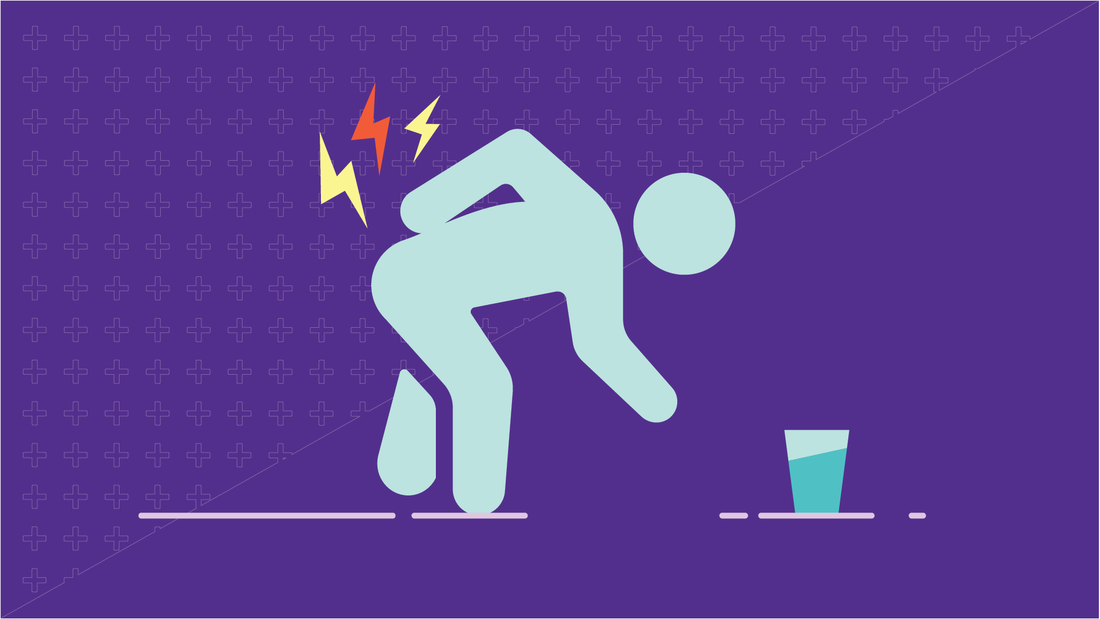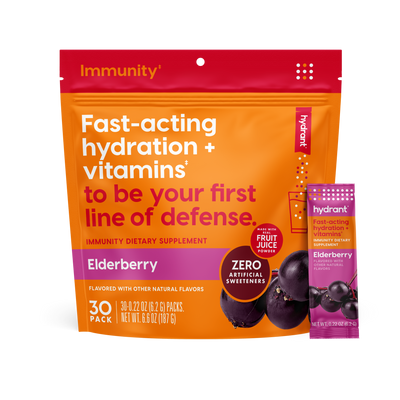A healthy human body is 60 percent water, so it shouldn’t be a surprise that your body’s hydration level has a huge impact on your overall health [1]. But one of the most painfully not-obvious things is the link between dehydration and back pain.
The unexpected link between dehydration and back pain
Roughly three-quarters of all Americans are chronically dehydrated [2]. Meanwhile, four out of five people battle back pain at some point in their lives, according to the American Chiropractic Association [3].
That might not be a coincidence. Here’s why:
Every cell in your body requires proper hydration for ideal health and functioning.
That includes the cells of back muscles that work to support your spine, and—especially—cells inside your spinal discs. Even mild dehydration can lead to issues.
Is your daily routine dehydrating?
Take our quiz and find out.
Dehydration and back pain: How it works
Spinal discs sit between each of your spine’s vertebrae. These discs provide cushioning and prevent wear-and-tear on the bones of the spine itself.
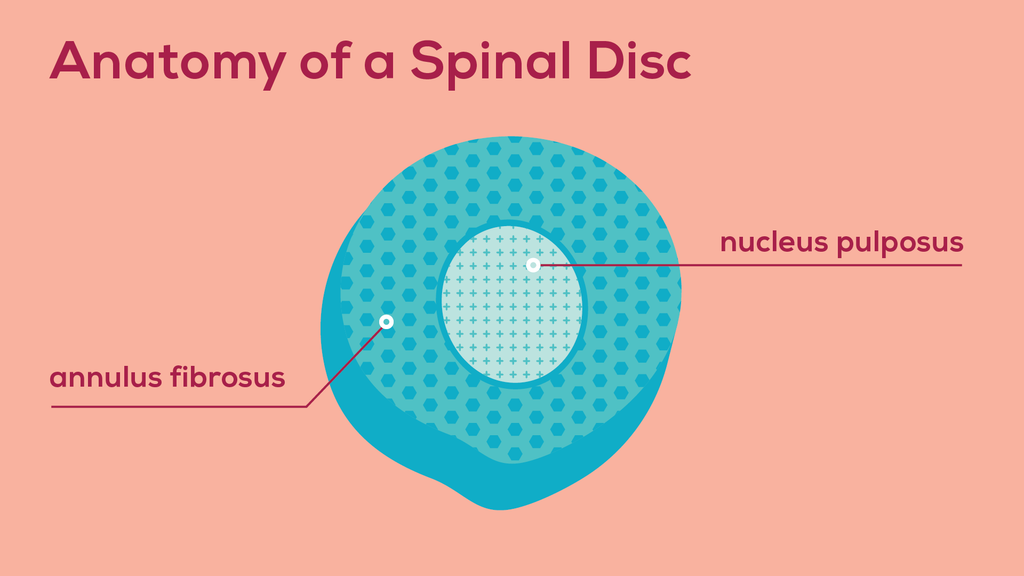
Each spinal disc has two parts [4]:
- An outer ring called the annulus fibrosus
- A jelly-like center called the nucleus pulposus, which is composed mostly of water.
Each and every day, as gravity pulls downward on the spine, a small amount of water in the discs is naturally lost. In fact, in one study of adults aged 30 and older, between 7 a.m. and 7 p.m., the average person lost 2/3rds of an inch in height. Some people actually became more than an inch shorter throughout the day [5].
If you’re getting enough water, though, your discs can rehydrate. They do so through a process called intradiscal fluid exchange, according to the Spine Institute of America [6].
If you don’t drink water in a sufficient quantity, aren’t achieving the right electrolyte balance (which makes absorbing water more difficult), or you losing excessive fluids and minerals through heat, exercise, or illness, spinal discs are unable to rehydrate.
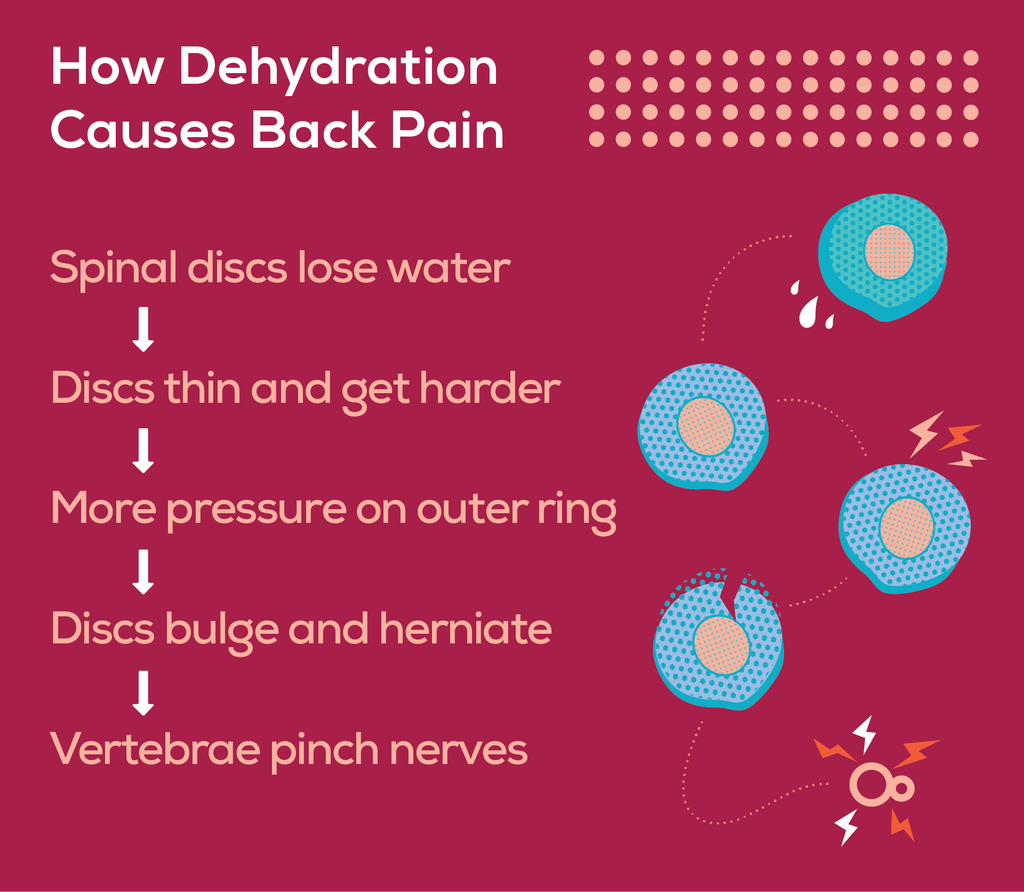
When spinal discs lose water, they become thinner, harder, and less able to absorb shock. This can damage both the dehydrated discs themselves and the vertebrae they’re meant to protect.
Since most of the fluids lost escape from the gel-like nucleus pulposus in the center, the outer ring winds up bearing more of your body weight than it was designed to.
Over time, this added pressure on the outer ring can lead to disc bulging and herniated discs.
Making matters worse, thinning of the dehydrated discs can also result in the vertebrae pinching nerves, which can cause intense back pain.
And since dehydration lowers blood pressure, it can further contribute to back discomfort by depriving the back’s muscles of the oxygen- and nutrient-rich blood they need [7].
Can drinking more water relieve back pain?
While it may sound too simple to be true, if dehydration is contributing to your back pain, drinking water throughout the day can ease it.
How much water should you drink? The National Academies of Sciences recommends that, on average, women consume at least 2.7 liters (91 ounces) of total water per day and men consume approximately 3.7 liters (125 ounces) per day [8]. These totals include water from both beverages and food, with the academy noting that roughly 20 percent of most people’s fluid levels come from water-rich foods like fruits and vegetables.
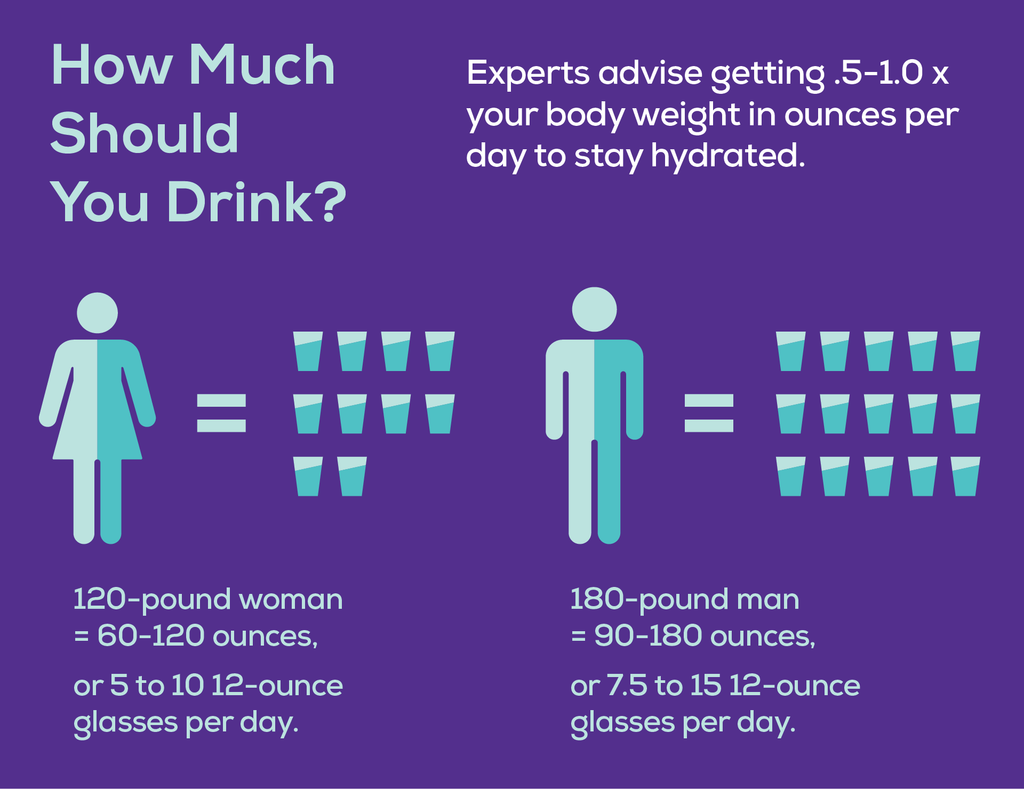
Since body size plays a large role in water intake needs, some experts advise getting half to one time your body weight in ounces of water per day to stay hydrated. So if you were a 120-pound woman, you’d want to aim for a minimum of five and, more ideally, up to ten 12-ounce glasses of water per day.
Symptoms of Dehydration (Besides an Achy Back)
Apart from tracking how much you drink, paying attention to some of the easy-to-spot symptoms of dehydration can help you stay healthy and avoid dehydration-related back pain. These include:
- Dark urine—aim for a light, straw-like color
- Dry mouth
- Dry skin
- Muscle cramps during activity or exercise
Of course, another symptom of dehydration is thirst. Research conducted in 2018 at the University of Arkansas suggests that if you are thirsty, your body is already dehydrated [9].
Work on improving the hydration level in your body and see how, over time, your back pain may lessen. If you find it hard (or boring) to drink so much more water, a rapid rehydration mix can help your body use the fluids you drink more effectively.
Lastly, of course, always consult with your doctor about options like physical therapy, MRI testing, or other treatments for combatting back pain. Hydration is an effective tool in the toolkit for battling bulging or herniated discs, according to the International Spine Institute, but it’s just one of many options [10].
Resources
[1] Water Science School. “The Water in You: Water and the Human Body.” USGS.gov. U.S. Department of the Interior. Retrieved from http://water.usgs.gov/edu/propertyyou.html
[2] Yoon, Carol Kaesuk. “U.S. Drinking Itself Dry, Study Finds” The New York Times. June 16, 1998. https://www.nytimes.com/1998/06/16/science/us-drinking-itself-dry-study-finds.html
[3] American Chiropractic Association. “Back Pain Facts and Statistics.” Acatoday.org. American Chiropractic Association. Retrieved from https://www.acatoday.org/Patients/Health-Wellness-Information/Back-Pain-Facts-and-Statistics
[4] Nedresky D, Singh G. Anatomy, Back, “Nucleus Pulposus.” [Updated 2018 Dec 18]. In: StatPearls [Internet]. Treasure Island (FL): StatPearls Publishing; 2019 Jan-. https://www.ncbi.nlm.nih.gov/books/NBK535373/
[5] Floyd B, Jayasinghe L, Dey C. “Factors influencing diurnal variation in height among adults.” Homo. 2017 May;68(3):236-241. doi: 10.1016/j.jchb.2017.03.004. Epub2017 Mar 19. PubMed PMID: 28400060. https://www.ncbi.nlm.nih.gov/pubmed/28400060
[6] Spine Institute of North America. “How Dehydration Affects Your Spine And Back.” Retrieved from https://spineina.com/blog/how-dehydration-affects-your-spine-and-back/
[7] National Heart, Lung and Blood Institute. “Low Blood Pressure.” NHLBI.NIH.GOV. U.S. Department of Health & Human Services Retrieved from https://www.nhlbi.nih.gov/health-topics/low-blood-pressure
[8] The National Academies of Sciences Engineering and Medicine: Health and Medicine Division. “Dietary Reference Intakes: Water, Potassium, Sodium, Chloride, and Sulfate” National Academies of Sciences. Retrieved from: http://www.nationalacademies.org/hmd/Reports/2004/Dietary-Reference-Intakes-Water-Potassium-Sodium-Chloride-and-Sulfate.aspx
[9] Adams JD, Sekiguchi Y, Suh HG, Seal AD, Sprong CA, Kirkland TW, Kavouras SA. “Dehydration Impairs Cycling Performance, Independently of Thirst: A Blinded Study.” Med Sci Sports Exerc. 2018 Aug;50(8):1697-1703. doi: 10.1249/MSS.0000000000001597. PubMed PMID: 29509643. https://www.ncbi.nlm.nih.gov/pubmed/29509643
[10] International Spine Institute. “Does Dehydration Cause Lower Back Pain?” International Spine Institute. Retrieved from: https://www.ispinei.com/2019/02/19/does-dehydration-cause-back-pain/










